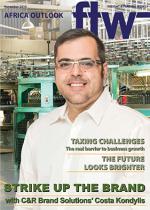Southern African countries will
need to collaborate far more
closely to form efficient supply
chains if they want to benefit from
the opportunities coming their way.
According to Craig Roberts,
CEO of DHL Supply Chain MEA,
exciting opportunities exist in the
wake of the signing of the European
Union (EU)/Southern Africa
economic partnership agreement
(EPA). He believes agricultural
exports in particular are set to
exponentially increase to the EU.
But, he said, this depended on
their ability to function as a single
market.
“The countries involved are going
to have to work together to form
an efficient supply chain as other
strong export-led industries such
as automotive and technology have
done. Only when the sector has
established a logistics process
whereby the myriad agricultural
providers are managed through
the entire export process will we
realistically unlock this potential,”
said Roberts.
Welcoming the greater access
that has been negotiated for
southern Africa
with the EU
market through
the agreement
that is set to
come into force
by March next
year, Roberts
said the
countries involved – South Africa,
Botswana, Namibia, Lesotho,
Swaziland and Mozambique –
however had only a few months to
prepare.
“There are many infrastructure
bottlenecks to significant
trade growth, but we have the
examples of the automotive and
technology industries which have
cultivated new export markets by
collaborating to a considerable
degree on their collective supply
chain. They are able to compete
internationally and have been
among the signal successes of South
African exports over the past two
decades. Now,
agricultural
exporters need
to emulate this
proven formula.”
Agricultural
products are
already one of
southern Africa’s
biggest exports to the EU, with
the value of agricultural goods
passing between SADC and Europe
totalling ¤2.9bn, which equates
to 9.3%, of approximately ¤31bn
total exports to the EU. The value of
South Africa’s agricultural exports
increased by 16.4% to ¤4 360m in
2012/13 from ¤3 745m in 2011/12.
In some cases, such as wine, the
quota has now been considerably
increased, so the potential exists to
supply the EU far more.
Through a collaborative supply
chain approach major efficiencies
can be achieved that could see
savings made in the export of fresh
produce in particular, said Roberts.
“Based on our experiences in
other emerging markets such as
India, we estimate that currently as
much as 20% of produce is spoiled
through a lack of integration within
the supply chain. India is not unique
in the level of its losses. According
to the FAO (Food and Agricultural
Organisation of the United Nations)
42% of fruit and vegetables grown
in the Asia-Pacific region, and up
to 20% of grain, never reaches
consumers because of poor postharvest
handling. Therefore, it is
not unreasonable to assume roughly
the same level of spoilage in Africa,
amounting to ¤568m (20% of the
¤2.9 billion value of agricultural
goods exported to the EU),” he said.
INSERT
20% The amount of produce spoiled in
emerging markets through lack of supply
chain integration.

